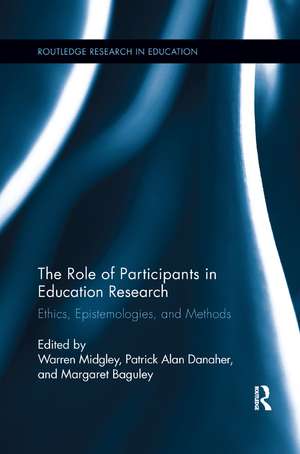The Role of Participants in Education Research: Ethics, Epistemologies, and Methods: Routledge Research in Education
Editat de Warren Midgley, Patrick Alan Danaher, Margaret Baguleyen Limba Engleză Paperback – 24 mai 2017
| Toate formatele și edițiile | Preț | Express |
|---|---|---|
| Paperback (1) | 455.78 lei 6-8 săpt. | |
| Taylor & Francis – 24 mai 2017 | 455.78 lei 6-8 săpt. | |
| Hardback (1) | 1056.63 lei 6-8 săpt. | |
| Taylor & Francis – 11 dec 2012 | 1056.63 lei 6-8 săpt. |
Din seria Routledge Research in Education
-
 Preț: 310.29 lei
Preț: 310.29 lei -
 Preț: 304.19 lei
Preț: 304.19 lei -
 Preț: 303.18 lei
Preț: 303.18 lei -
 Preț: 147.15 lei
Preț: 147.15 lei -
 Preț: 276.13 lei
Preț: 276.13 lei -
 Preț: 302.17 lei
Preț: 302.17 lei -
 Preț: 303.75 lei
Preț: 303.75 lei -
 Preț: 290.73 lei
Preț: 290.73 lei -
 Preț: 310.31 lei
Preț: 310.31 lei - 8%
 Preț: 381.60 lei
Preț: 381.60 lei -
 Preț: 304.83 lei
Preț: 304.83 lei -
 Preț: 377.85 lei
Preț: 377.85 lei -
 Preț: 401.01 lei
Preț: 401.01 lei -
 Preț: 310.65 lei
Preț: 310.65 lei -
 Preț: 303.89 lei
Preț: 303.89 lei -
 Preț: 129.83 lei
Preț: 129.83 lei -
 Preț: 310.08 lei
Preț: 310.08 lei -
 Preț: 310.22 lei
Preț: 310.22 lei -
 Preț: 294.39 lei
Preț: 294.39 lei - 8%
 Preț: 381.99 lei
Preț: 381.99 lei - 9%
 Preț: 867.43 lei
Preț: 867.43 lei - 9%
 Preț: 1003.95 lei
Preț: 1003.95 lei -
 Preț: 303.89 lei
Preț: 303.89 lei -
 Preț: 358.67 lei
Preț: 358.67 lei - 8%
 Preț: 389.47 lei
Preț: 389.47 lei - 18%
 Preț: 1060.52 lei
Preț: 1060.52 lei - 18%
 Preț: 1116.74 lei
Preț: 1116.74 lei -
 Preț: 397.75 lei
Preț: 397.75 lei - 18%
 Preț: 1221.80 lei
Preț: 1221.80 lei - 18%
 Preț: 1110.74 lei
Preț: 1110.74 lei - 18%
 Preț: 1053.92 lei
Preț: 1053.92 lei - 18%
 Preț: 1162.84 lei
Preț: 1162.84 lei - 18%
 Preț: 1063.65 lei
Preț: 1063.65 lei - 28%
 Preț: 851.82 lei
Preț: 851.82 lei - 18%
 Preț: 1054.75 lei
Preț: 1054.75 lei - 18%
 Preț: 1054.58 lei
Preț: 1054.58 lei - 18%
 Preț: 1178.85 lei
Preț: 1178.85 lei - 18%
 Preț: 1111.72 lei
Preț: 1111.72 lei - 18%
 Preț: 1057.75 lei
Preț: 1057.75 lei -
 Preț: 489.03 lei
Preț: 489.03 lei - 18%
 Preț: 1059.14 lei
Preț: 1059.14 lei - 18%
 Preț: 1050.09 lei
Preț: 1050.09 lei - 18%
 Preț: 1060.52 lei
Preț: 1060.52 lei - 18%
 Preț: 1062.98 lei
Preț: 1062.98 lei - 18%
 Preț: 1056.28 lei
Preț: 1056.28 lei - 18%
 Preț: 1217.63 lei
Preț: 1217.63 lei - 18%
 Preț: 1060.19 lei
Preț: 1060.19 lei - 18%
 Preț: 1170.84 lei
Preț: 1170.84 lei - 18%
 Preț: 1167.36 lei
Preț: 1167.36 lei
Preț: 455.78 lei
Nou
Puncte Express: 684
Preț estimativ în valută:
87.24€ • 94.80$ • 73.33£
87.24€ • 94.80$ • 73.33£
Carte tipărită la comandă
Livrare economică 22 aprilie-06 mai
Preluare comenzi: 021 569.72.76
Specificații
ISBN-13: 9781138118560
ISBN-10: 1138118567
Pagini: 280
Ilustrații: 22
Dimensiuni: 152 x 229 x 15 mm
Greutate: 0.45 kg
Ediția:1
Editura: Taylor & Francis
Colecția Routledge
Seria Routledge Research in Education
Locul publicării:Oxford, United Kingdom
ISBN-10: 1138118567
Pagini: 280
Ilustrații: 22
Dimensiuni: 152 x 229 x 15 mm
Greutate: 0.45 kg
Ediția:1
Editura: Taylor & Francis
Colecția Routledge
Seria Routledge Research in Education
Locul publicării:Oxford, United Kingdom
Public țintă
Postgraduate and UndergraduateCuprins
1. Imagining and Reimagining the Role of Participants in Education Research: Ethics, Epistemologies, and Methods Patrick Alan Danaher, Margaret Baguley and Warren Midgley Part I: Ethics Part 1 Introduction: Ethics Warren Midgley 2. Researching Sexual Minority and Gender Variant Youth and Their Growth into Resilience André P. Grace 3. Dangers of Member Checking Ronald E. Hallett 4. Hearing Participants Within Emotionally Challenging Environments John Hurley, Paul Linsley, Sheena MacLeod and Michael Ramsay 5. Researchers as Participants, Participants as Researchers Louise Phillips and Agli Zavros 6. Doing What Works: Challenges to Being Ethically ‘Reasonable’ Thomas Webster Part II: Epistemologies Part II Introduction: Epistemologies Margaret Baguley 7. The Significance of the Linguistic Representation of Self in Research Yvonne Salton 8. Conceptualizing Research Participants as ‘Significant Others’ in the Construction of Empirical Knowledge Dolene Rossi 9. Blurring the Boundaries: The Transformative Nature of Research Participation Katie Makar and Mia O’Brien 10. The Country’s Not What It Used to Be: Research Participants’ Understandings of Space, Place and Identity in Rural Victoria Bernadette Walker-Gibbs 11. Naming, Framing, and Sometimes Shaming: Reimagining Relationships with Education Research Participants Janet Cook, Mike Danaher, Geoff Danaher and Patrick Alan Danaher Part III: Methods Part III Introduction: Methods Patrick Alan Danaher 12. Understanding Taboos with Asian American Women Through Autoethnography June A. Gordon 13. "Laat Dit Goed Gaan": Revisioning Education Research Through Teaching Afrikaans as a Foreign Language to Australian Adolescents on the Basis of Moral Education and Ethics of Care Henriette van Rensburg 14. Participants and Research Method Design: The Development of Narrative Discussion Group Method Warren Midgley 15. Greater Than the Sum of the Parts: The Formation of a School/University Research Team Margaret Baguley, Jeffrey Campbell, Vaughan Cruickshank, Julianne Daunt, Martin Kerby, Abbey MacDonald, Robyn Mann, Susie McDonald, Steve Monk, Toni Riordan, Susan Santoli, Paige Vitulli and Nicole Webster 16. How Do the Participants Feel About Learning Statistics? Exploring Group Differences in Middle School Students’ Interest Colin Carmichael 17. Actor-Network Theory: A Device for Reimagining Participants in Education Research Jo Luck Respondent’s Text: Taking Researching With Vs. Researching On Seriously: A Detour via the Intercultural? Fred Dervin
Descriere
This book explores different perspectives on the role, influence and importance of participants in education research. Drawing on a variety of philosophical, theoretical and methodological approaches, the book examines how researchers relate to and with their participants before, during, and after the collection and/or production of data; reimagining the rights of participants, the role/s of participants, the concept/s of "participant" itself.














